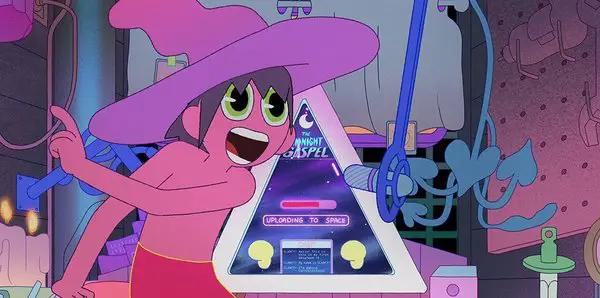Adventure Time may go down as one of the most beloved cartoons of the past decade, being upheld through merchandise, cosplayers, and an ardent fandom. The colorful and playful animation style of the show is uniquely vivid, and using this style in adult animation may partially be reminiscent of cartoons like Rick and Morty. This is the case with The Midnight Gospel — Netflix’s latest animated show produced by Pendleton Ward (producer of Adventure Time) and Duncan Trussel (of the podcast: The Duncan Trussell Family Hour).
The Midnight Gospel’s first season is a mind-bending experience, following Clancy (Trussell), a young explorer who embarks on journeys via his universe simulator. Clancy visits different planets and meets a number of personalities with the intention of interviewing them for his podcast, suitably dubbed The Midnight Gospel.

The series is playful yet enlightening, and although it offers a juxtaposition of tones that can be found in other series, The Midnight Gospel stands apart from others in its medium based on its concept; that is, the show is literally derived from The Duncan Trussel Family Hour.
Animating a Conversation
If you’ve listened to Trussell’s podcast or a podcast of a similar nature (e.g. The Joe Rogan Experience, Making Sense with Sam Harris), you’ll have a greater understanding of what’s going on within the show. What The Midnight Gospel does is take Trussell’s interviews that delve into enlightening topics and place them within the context of an episode’s storyline, essentially animating a podcast. 2001’s Waking Life is partially similar to The Midnight Gospel in terms of animating philosophical dialogues, although the latter is mostly unscripted.
An interesting aspect of the series is that Trussell’s real-life guests come on as experts in the topics they discuss, but within the context of the show they’re often random creatures going through the strangest of situations. As one could imagine, the nature of the show leads to plenty of fourth-wall breaks, and each episode is approached with a sense of light-heartedness, making the exploration of hefty topics feel unpretentious and digestible for those with little to no insight on what’s being discussed.
The series may strike a deeper chord with viewers that enjoy topics that revolve around the likes of death, birth, and mindfulness rather than viewers looking for contextual entertainment. Hearing these topics be discussed over the course of an unfolding psychedelic narrative is intriguing, but I’d argue that this is far more a show for fans of podcasts than it is fans of animated TV shows. The conversations offer a deeper understanding of the human experience, and many times they feel raw, which is especially present in the last episode of the series; however, in other instances, the substance can also take away from the narrative at hand.
Grasping Surrealism
The premise is undoubtedly unique and imaginative, but by creating an animated series where the focus is on dialogue, viewers may find their attention divided. The show looks colorful and surreal but grounds itself with thoughtful conversations, and with narrative and substance at times distant, The Midnight Gospel could feel like its pulling concentration in opposing directions, making the viewing experience feel a bit convoluted. This show may not exactly be a bingeable addition to Netflix’s catalog because there is so much to take in; at face value, however, the show is still an insightful, trippy experience.
The mere concept that’s achieved here is imaginative and full of curiosity and wonder, and realizing that animators were able to create a multicolored cartoon around an unscripted podcast raises its value. Admittedly, the series is not as eye-popping as some other animated television shows, and the lack of structure can occasionally lower its entertainment value. Nonetheless, there are levels to The Midnight Gospel that are undoubtedly captivating, but depending on how one interprets the show will shift their viewing experience.
The Midnight Gospel: Conclusion
Whether you’re a fan of podcasts or adult animation, The Midnight Gospel offers a mind-bending experience to viewers that has not really been seen before. Its genuine approach to weighty topics is raw and potentially cathartic, and it grounds the characters to feel real and relatable — well, that’s because they basically are. Although the series has its flaws and may be difficult to grasp in a single sitting, there’s enough there to be appreciated for those seeking an animated approach to psychedelic enlightenment.
What did you think of The Midnight Gospel? Would you like to see another season? Let us know!
Watch The Midnight Gospel
Does content like this matter to you?
Become a Member and support film journalism. Unlock access to all of Film Inquiry`s great articles. Join a community of like-minded readers who are passionate about cinema - get access to our private members Network, give back to independent filmmakers, and more.